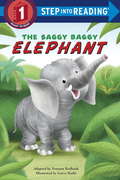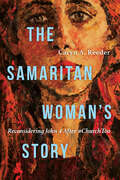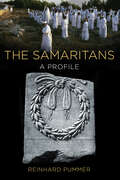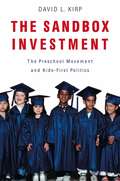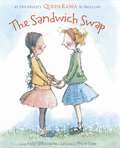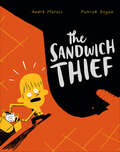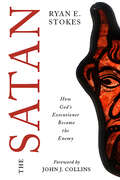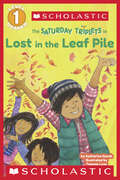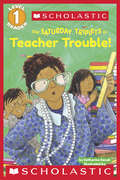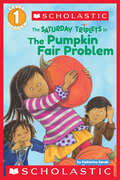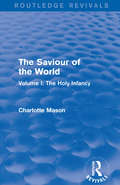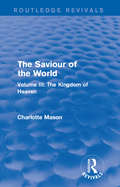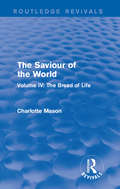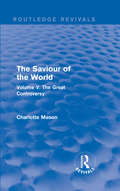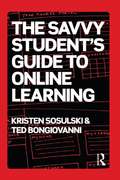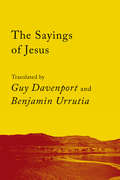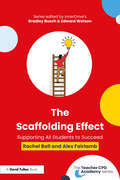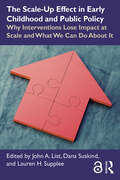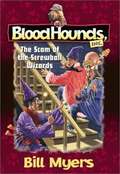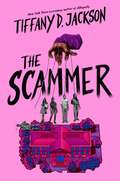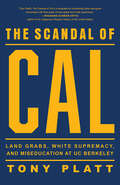- Table View
- List View
The Saggy Baggy Elephant (Step into Reading)
by Tennant Redbank Garva HathiThe Saggy Baggy Elephant stars in his first Step into Reading book! Fans of Sooki, the Saggy Baggy Elephant, star of one of the bestselling Little Golden Books of all time, will now be able to read about him all on their own! This Step 1 Step into Reading title has been adapted from the original Little Golden Book story for early readers. Freshly illustrated in the style of the original book, this sweet tale about Sooki and his jungle adventures is a perfect addition to the Step into Reading line. Step 1 Readers feature big type and easy words for children who know the alphabet and are eager to begin reading. Rhyme and rhythmic text paired with picture clues help children decode the story.
The Sales Advantage: How to Get It, Keep It, and Sell More Than Ever (Dale Carnegie Books)
by Dale Carnegie J. Oliver Crom Michael A. CromNow, for the first time ever, the time-tested, proven techniques perfected by the world-famous Dale Carnegie® sales training program are available in book form. The two crucial questions most often asked by salespeople are: "How can I close more sales?" and "What can I do to reduce objections?" The answer to both questions is the same: You learn to sell from a buyer's point of view. Global markets, increased technology, information overload, corporate mergers, and complex products and services have combined to make the buying/selling process more complicated than ever. Salespeople must understand and balance these factors to survive amid a broad spectrum of competition. Moreover, a lot of what the typical old-time salesperson did as recently as ten years ago is now done by e-commerce. The new sales professional has to capture and maintain customers by taking a consultative approach and learning to unearth the four pieces of information critical to buyers, none of which e-commerce alone can yield. The Sales Advantage will enable any salesperson to develop long-term customer relationships and help make those customers more successful—a key competitive advantage. The book includes specific advice for each stage of the eleven-stage selling process, such as: • How to find prospects from both existing and new accounts • The importance of doing research before approaching potential customers • How to determine customers' needs, such as their primary interest (what they want), buying criteria (requirements of the sale), and dominant buying motive (why they want it) • How to reach the decision makers • How to sell beyond questions of price The cutting-edge sales techniques in this book are based on interviews accumulated from the sales experiences of professionals in North America, Europe, Latin America, and Asia. This book, containing more than one hundred examples from successful salespeople representing a wide variety of products and services from around the world, provides practical advice in each chapter to turn real-world challenges into new opportunities. The Sales Advantage is a proven, logical, step-by-step guide from the most recognized name in sales training. It will create mutually beneficial results for salespeople and customers alike.
The Samaritan Woman's Story: Reconsidering John 4 After #ChurchToo
by Caryn A. ReederMost Christians have heard a familiar description of the Samaritan woman in John 4: she was a sinner, an adulteress, even a prostitute. Throughout church history, the woman at the well has been seen narrowly in terms of her gender and marital history. What are we missing in the story? And what difference does our interpretation of this passage make for women and men in the church? Caryn A. Reeder calls us to see the Samaritan woman in a different light. Beginning with the reception history of John 4, she pulls back layers of interpretation entangled with readers' assumptions on women and sexuality. She then explores the story's original context, describing life for women and expectations regarding marriage and divorce in the first century. With this clarified lens, Reeder's exegesis of the passage yields refreshing insights on what the Gospel says���and does not say���about the woman at the well. Throughout the book, Reeder draws connections between interpretations of this text and the life of the church. The sexual objectification of the Samaritan woman and minimization of her positive contribution has ongoing consequences for how women are seen and treated���including in the failure of many Christian communities to respond well to accusations of abuse. In the age of #MeToo and #ChurchToo, The Samaritan Woman's Story offers a bold challenge to teach the Bible in a way that truly honors the value and voices of women.
The Samaritans: A Profile
by Reinhard PummerAuthoritative introduction to the Samaritan tradition from antiquity to the present Most people associate the term "Samaritan" exclusively with the New Testament stories about the Good Samaritan and the Samaritan woman at Jacob's well. Very few are aware that a small community of about 750 Samaritans still lives today in Palestine and Israel; they view themselves as the true Israelites, having resided in their birthplace for thousands of years and preserving unchanged the revelation given to Moses in the Torah. Reinhard Pummer, one of the world's foremost experts on Samaritanism, offers in this book a comprehensive introduction to the people identified as Samaritans in both biblical and nonbiblical sources. Besides analyzing the literary, epigraphic, and archaeological sources, he examines the Samaritans' history, their geographical distribution, their version of the Pentateuch, their rituals and customs, and their situation today. There is no better book available on the subject.
The Sanctity of Life and the Criminal Law
by Dennis J. Baker Jeremy HorderDescribed by The New York Times as 'Britain's foremost scholar of criminal law', Professor Glanville Williams was one of the greatest academic lawyers of the twentieth century. To mark the centenary of his birth in 2011, leading criminal law theorists and medical law ethicists from around the world were invited to contribute essays discussing the sanctity of life and criminal law while engaging with Williams' many contributions to these fields. In re-examining his work, the contributors have produced a provocative set of original essays that make a significant contribution to the current debate in these areas.
The Sandbox Investment: The Preschool Movement and Kids-First Politics
by David L. KirpListen to a short interview with David L. Kirp Host: Chris Gondek | Producer: Heron & Crane The rich have always valued early education, and for the past forty years, millions of poor kids have had Head Start. Now, more and more middle class parents have realized that a good preschool is the smartest investment they can make in their children's future in a competitive world. As The Sandbox Investment shows, their needs are key to the growing call for universal preschool. Writing with the verve of a magazine journalist and the authority of a scholar, David L. Kirp makes the ideal guide to this quiet movement. He crouches in classrooms where committed teachers engage lively four-year-olds, and reveals the findings of an extraordinary longitudinal study that shows the life-changing impact of preschool. He talks with cutting-edge researchers from neuroscience and genetics to economics, whose findings increasingly show how powerfully early childhood shapes the arc of children's lives. Kids-first politics is smart economics: paying for preschool now can help save us from paying for unemployment, crime, and emergency rooms later. As Kirp reports from the inside, activists and political leaders have turned this potent idea into campaigns and policies in red and blue states alike. The Sandbox Investment is the first full story of a campaign that asks Americans to endorse a vision of society that does well by doing good. For anyone who is interested in politics or the social uses of research--for anyone who's interested in the children's futures--it's a compelling read.
The Sands of Shark Island (School Ship Tobermory #2)
by Alexander Mccall SmithImagine going to school on a boat! The rip-roaring excitement continues in the second volume of this adventure-mystery series set on the high seas, from the author of the beloved No. 1 Ladies’ Detective Agency! Ben and Fee MacTavish and their schoolmates on board the School Ship Tobermory are headed thousands of miles from their base in Mull to a small island in the Caribbean. They will learn extraordinary details about Captain Macbeth’s past and come face to face with modern-day pirates. The students and crew aboard the Tobermory will have to band together and use their wits to escape harm and overcome the evil pirates.
The Sandwich Swap
by Rania Al Abdullah Kelly Dipucchio<P>Lily and Salma are best friends. They like doing all the same things --jumping rope, drawing pictures, playing on the swings. And they always eat lunch together. <P>Sure, they don't eat the same lunch. Lily eats peanut butter and Salma eats hummus --but what's that between friends? <P>It turns out, a lot. And before they know it, it's a food fight. <P>Can Lily and Salma put aside their differences and save their friendship? Or will a sandwich come between them? <P>Her Majesty Queen Rania of Jordan and bestselling author Kelly DiPucchio tell a story inspired by Her Majesty's own childhood. Salma and Lily reach the true spirit of tolerance and acceptance. The smallest things can pull us apart--until we learn that friendship is far more powerful than difference. Ages 3-7
The Sandwich Thief
by Patrick Doyon Andre MaroisMarin loves the sandwiches his parents make for him--every day they're different and more delicious than the last. One morning, someone dares to steal his favorite sandwich: ham-cheddar-kale. Furious, Marin begins a fevered and famished investigation to unmask the thief. The days go by, the suspects multiply, and Marin's sandwiches continue to disappear. This droll, graphic caper is a funny school mystery exploring the high stakes of low blood sugar. The first in a series, the book's witty text and graphic illustrations make this funny school mystery perfect for early and advanced readers alike--and for anyone who's been the victim of lunchtime crime.
The Satan: How God's Executioner Became the Enemy
by Ryan E. StokesMany people today think of Satan as a little red demon with a pointy tail and a pitchfork—but this vision of the devil developed over many centuries and would be foreign to the writers of the Old Testament, where this figure makes his first appearances. The earliest texts that mention the Satan—it is always &“the Satan&” in the Old Testament—portray him as an agent of Yahweh, serving as an executioner of evildoers. But over the course of time, the Satan came to be regarded more as God&’s enemy than God&’s agent and was blamed for a host of problems.Biblical scholar Ryan E. Stokes explains the development of the Satan tradition in the Hebrew scriptures and the writings of early Judaism, describing the interpretive and creative processes that transformed an agent of Yahweh into the archenemy of good. He explores how the idea of a heavenly Satan figure factored into the problem of evil and received the blame for all that is wrong in the world.
The Saturday Triplets in: Lost in the Leaf Pile (Scholastic Reader, Level 1)
by Katharine KenahFall has just gotten three times as nice with the Saturday Triplets!Triplets Ana, Bella, and Carlos are always looking for an adventure. And on Saturday mornings they always seem to find one!This Saturday, the triplets race to rake the fastest, the best, the biggest leaf pile ever! And when their cat, Boo, goes missing, they think they know where he must be...but they're in for quite a surprise when Boo is nowhere to be found!
The Saturday Triplets in: Teacher Trouble! (Scholastic Reader, Level 1)
by Katharine KenahHave three times the fun with the Saturday Triplets!Triplets Ana, Bella, and Carlos are always looking for an adventure. And on Saturday mornings they always seem to find one!This Saturday, the triplets want to play teacher. But with a class full of stuffed animals and one very naughty cat, the school day doesn't turn out quite like they plan. Will the triplets give their class an A+?
The Saturday Triplets in: The Pumpkin Fair Problem (Scholastic Reader, Level 1)
by Katharine KenahEvery Saturday is an adventure for these feisty triplets!Triplets Ana, Bella, and Carlos are always looking for an adventure. And on Saturday mornings they always seem to find one!This Saturday, the triplets are going to the Pumpkin Fair! Ana wants to go on a ride. Bella would rather find the horses. And Carlos wants to listen to music. But the triplets have to stay together. Will they find an adventure perfect for three very different personalities?
The Saviour of the World: Volume I: The Holy Infancy (Routledge Revivals)
by Charlotte M MasonThe Saviour of the World covers each incident and each saying in the Bible and converts them to either a single poem, blank verse or rhymed stanza, according to the subject. This volume, called The Holy Infancy, was originally published in 1908. This book will be of interest to students of both religious studies and English literature.
The Saviour of the World: Volume III: The Kingdom of Heaven (Routledge Revivals)
by Charlotte M MasonThe Saviour of the World covers each incident and each saying in the Bible and converts them to either a single poem, blank verse or rhymed stanza, according to the subject. This volume, called The Kingdom of Heaven, was originally published in 1909. This book will be of interest to students of both religious studies and English literature.
The Saviour of the World: Volume IV: The Bread of Life (Routledge Revivals)
by Charlotte M MasonThe Saviour of the World covers each incident and each saying in the Bible and converts them to either a single poem, blank verse or rhymed stanza, according to the subject. This volume, called The Bread of Life, was originally published in 1910. This book will be of interest to students of both religious studies and English literature.
The Saviour of the World: Volume V: The Great Controversy (Routledge Revivals)
by Charlotte M MasonThe Saviour of the World covers each incident and each saying in the Bible and converts them to either a single poem, blank verse or rhymed stanza, according to the subject. This volume, called The Great Controversy, was originally published in 1911. This book will be of interest to students of both religious studies and English literature.
The Savvy Student's Guide to Online Learning: By Kristen Sosulski And Ted Bongiovanni
by Kristen Sosulski Ted BongiovanniThe Savvy Student’s Guide to Online Learning prepares students of all kinds for contemporary online learning. While technologies and formats vary, this book serves as an authoritative resource for any student enrolling in an online degree program or taking an online course. Topics covered include: • How to become a great online student • Creating an online presence • Interaction and communication techniques • Online group projects and individual work • Technological requirements and how to get technical support • Online classroom "netiquette" and time management The authors, both experts in online education, introduce the information and skills required of successful online students to navigate this new learning landscape with confidence. A highly useful companion website provides video presentations that explain the different types of online learning as well as a real online course with activities for students to practice and interact with other learners around the world.
The Sayings of Jesus: The Logia of Yeshua (Counterpoints #3)
by Guy Davenport and Benjamin UrrutiaJesus was a street preacher who taught through story and aphorism. Antedating the Gospels, these 105 sayings were recorded by his followers during and shortly after his lifetime. Through the immediacy of direct quotation, Guy Davenport and Benjamin Urrutia’s bold translation shakes our preconceptions, reintroducing us to the West’s greatest teacher, whose powerful words ring anew.
The Scaffolding Effect: Supporting All Students to Succeed (The Teacher CPD Academy)
by Alex Fairlamb Rachel BallScaffolding is the support teachers provide students so they can successfully progress from novice to expert and is a crucial part of teaching and classroom management. This exciting book explores the research behind scaffolding and adaptive teaching whilst also debunking the myths and misconceptions behind this approach.Drawing on evidence from cognitive science, it brings together best practice of tried and tested methods of effective scaffolding across different settings and disciplines. Featuring practical classroom examples, research evidence, and case studies, the chapters cover: The link between cognitive science and effective scaffolding strategies Using scaffolding to support literacy and oracy Scaffolding in practical subjects Ways to scaffold homework How to modify scaffolding for different ages and settings Pitfalls to avoid when implementing scaffolding Part of the Teacher CPD Academy series from InnerDrive, this is essential reading for all teachers and school leaders that want evidence-based strategies which focus on impact in the classroom in sustainable and meaningful ways.
The Scale-Up Effect in Early Childhood and Public Policy: Why Interventions Lose Impact at Scale and What We Can Do About It
by John A. ListThis critical volume combines theoretical and empirical work across disciplines to explore what threatens scalability—and what enables it—in the early childhood field. Authors and editors provide specific recommendations to help professionals refine and apply the science of scaling in their programs, research, and decision making. Written by leading experts in early childhood, economics, psychology, public health, philanthropy, and more, chapters and commentaries shine light on how to effectively use experimental insights for policy purposes. The result is a comprehensive and forward-thinking guide to the challenges and possibilities of effective scaling in early childhood and beyond. Essential reading for researchers, practitioners, funders, and policy makers alike, this book raises vital questions and provides a vision for the long-term journey to scalable evidence.
The Scale-Up Effect in Early Childhood and Public Policy: Why Interventions Lose Impact at Scale and What We Can Do About It
by John A. ListThis critical volume combines theoretical and empirical work across disciplines to explore what threatens scalability—and what enables it—in the early childhood field. Authors and editors provide specific recommendations to help professionals refine and apply the science of scaling in their programs, research, and decision making.Written by leading experts in early childhood, economics, psychology, public health, philanthropy, and more, chapters and commentaries shine light on how to effectively use experimental insights for policy purposes. The result is a comprehensive and forward-thinking guide to the challenges and possibilities of effective scaling in early childhood and beyond.Essential reading for researchers, practitioners, funders, and policy makers alike, this book raises vital questions and provides a vision for the long-term journey to scalable evidence.
The Scam of the Screwball Wizards (Bloodhounds, Inc. #10)
by Bill MyersMadcap MYSTERIES With a MESSAGE! What's going on in the abandoned theater on the outskirts of Midvale? Have monsters really invaded Mrs. Tubbs' home? Is Slobs, the trusted bloodhound, next? Likeable, easy-going Bear isn't really one for reading (except for the back of cereal boxes), so when he starts plowing through a popular new book series, everyone is pretty impressed and a little shocked. But now he's calling himself "The Phangmaster" and no longer cares about his oíd friends--and thinks he can cast spells on anyone who gets in his way. It's up to Bloodhounds, Inc., to find out what's going on as Sean, Melissa, and trusted sidekick Jeremiah get to the bottom of the new craze of fantasy books sweeping their town.
The Scammer
by Tiffany D JacksonNew York Times bestselling author Tiffany D. Jackson delivers another stunning, ripped-from-the-headlines thriller, following a freshman girl whose college life is turned upside down when her roommate’s ex-convict brother moves into their dorm and starts controlling their every move.Out from under her overprotective parents, Jordyn is ready to kill it in prelaw at a prestigious, historically Black university in Washington DC. When her new roommate’s brother is released from prison, the last thing Jordyn expects is to come home and find the ex-convict on their dorm room sofa. But Devonte needs a place to stay while he gets back on his feet—and how could she say no to one of her new best friends?Devonte is older, as charming as he is intelligent, pushing every student he meets to make better choices about their young lives. But Jordyn senses something sinister beneath his friendly advice and growing group of followers. When one of Jordyn’s roommates goes missing, she must enlist the help of the university’s lone white student to uncover the mystery—or become trapped at the center of a web of lies more tangled than she can imagine.
The Scandal of Cal: Land Grabs, White Supremacy, and Miseducation at UC Berkeley
by Tony PlattThe incendiary story of conquest, racism, warfare, and historical amnesia at one of the world’s most celebrated and ostensibly enlightened public universities."This is a land acknowledgment." —Ruth Wilson Gilmore, author of Abolition Geography: Essays towards Liberation"The Scandal of Cal is a template for scrutinizing other land-grant universities … This is a beautifully written and heartbreaking narrative." —Roxanne Dunbar-Ortiz, author of An Indigenous Peoples’ History of the United StatesThe University of California, Berkeley—widely known as "Cal"—is admired worldwide as a bastion of innovation and a hub for progressive thought. Far less known are the university’s roots in plunder, warfare, and the promotion of white supremacy. As Tony Platt shows in The Scandal of Cal, these original sins sit at the center of UC Berkeley’s history. Platt looks unflinchingly at the university’s desecration of graves and large-scale hoarding of Indigenous remains. He tracks its role in developing the racist pseudoscience of eugenics in the early twentieth century. He sheds light on the school’s complicity with the military-industrial complex and its incubation of unprecedented violence through the Manhattan Project. And he underscores its deliberate and continued evasions about its own wrongdoings, which echo in the institution’s decision-making up to the present day. This book, above all, illuminates Cal’s culpability in some of the cruelest chapters of US history and sounds a clarion call for the university to undertake a thorough and earnest reckoning with its past. It is required reading for Cal alumni, students, faculty, and staff, and for anyone concerned with the impact of higher education in the United States and beyond.
